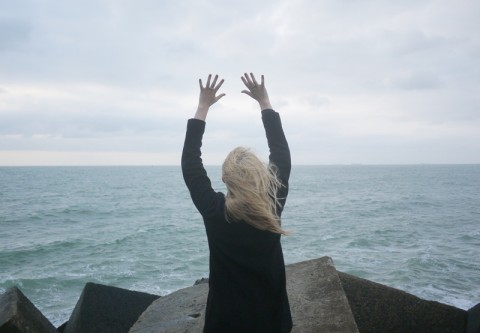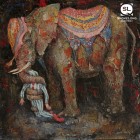The girl would kick it on the way home from school, some fallen thing on the ground. Perhaps a stone, squarish, leaping small across other stones. I think it must have been a stone.
The path of her punt was a lazy line, a gentle skid, the stone hopping in short dusty zags a foot or two. When the girl gave the stone a boot with her black leather shoes, it was not to make the stone fly or sail. Just a small skip so she could walk and kick it again.
Skip, walk, kick. The girl never did kick one all the way home. Her road went up a hill and down, and after the crest, the stone would gain velocity and away from her it would go.
If a jeepney rattled by, snorts of blue diesel and trebly music in its wake, and she had to step off the road and leave the stone behind, that was fine. If the stone went into the weeds and it was gone, that was fine too and she would keep walking. She once told me kicking the stone was only a little game she played.
But sometimes the stone seemed special; something about its heft or color or circumference, the way it skittered across the dirt apart from the stones around it, made it worth keeping. And sometimes the girl would kick it too far, or aslant, and the special stone would fall and come to rest farther away, and maybe the girl would chase it into the tall grass or the bushes of red santan. There was a chance she would find it again, so she would look, see if she could kick it back into the road.
The girl would choose to retrieve it or let it go. She would do this without thinking. This was as it should be, for it was only a stone.
#
There is a hole in the ground by the side of the road. A well, now wreathed with vines, the kind that clutches at rock and creeps over abandoned houses, hiding what is beneath.
And the grass grows around it, almost tall as a man, the amihan wind sighing through it from the east across the bay.
Well, vine, grass. As a young girl I played here. We dared each other to look down the well, with a little pretend push at the small of the back. We couldn’t see the bottom, it was so far down.
Then they piped water to the village and told us not to drink from the well anymore. By then the cement perimeter had crumbled, kicked by teenagers into the well, the bucket gone, the wooden boards over the hole stolen for kindling.
It could have been filled in, that well. We could have filled it ourselves, with all the useless things, all into the well: bottles, cans, sticks. Stones tossed from the edge, or from a distance, stones of all sizes, stones that flew or sailed, filling the absence until the well was no longer a well.
#
She was eleven: two number ones, standing like sticks, or marks scratched on stone.
A sprig of a girl, legs like twigs that could snap.
I have those skinny legs of hers too; she got those from me.
Sometimes I saw her father in her, the stubborn slant of his jaw.
A scar above her right knee, or maybe her left, against her brown skin, hiding beneath her school uniform.
A tear in her blue checkered skirt. I mended it, needle pinched between fingers, deep into the night.
Her backpack heavy, a ruled notebook for every class. Pink straps and the tropical sun digging into her thin shoulders.
The weather close and humid, a gray sheet, hovering and heavy, the girl trudging into the thickness of the day.
Once she came home with dusty shoes, and I scolded her.
Once she came home with a flower in her hair.
I brushed her long hair, as my mother did mine, and she would tell me about her day at school. Then it was time for bed. Sometimes I would watch her sleeping.
We lived past where the road turned from cement into gravel, then into mud when the monsoons came. On her way home she walked past the new houses. Houses so big, with stairs and second floors.
She must have wondered what that would be like, to wake in the morning on a floor above the dirt. Above the grass, above the earth.
Dirt, grass, earth. She must have seen something in the weeds, like a flower, or something that glinted and called to her.
She stepped off the path, that was all.
Or the stone was special, and she followed it, saw its dusty arc skipping off the road, curving into space and falling and coming to rest.
#
Stone, well, girl. And still I cannot stitch them together with my grief.



 The core workshop of SmokeLong Fitness is all in writing, so you can take part from anywhere at anytime. We are excited about creating a supportive, consistent and structured environment for flash writers to work on their craft in a community. We are thrilled and proud to say that our workshop participants have won, placed, or been listed in every major flash competition. Community works.
The core workshop of SmokeLong Fitness is all in writing, so you can take part from anywhere at anytime. We are excited about creating a supportive, consistent and structured environment for flash writers to work on their craft in a community. We are thrilled and proud to say that our workshop participants have won, placed, or been listed in every major flash competition. Community works.